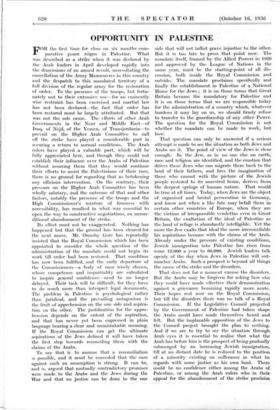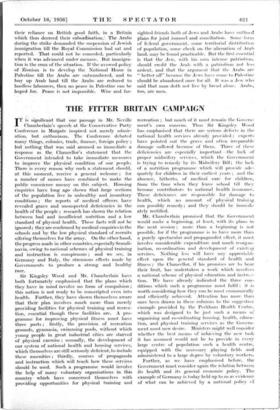OPPORTUINiITY IN PALESTINE
FOR the 'first time for close on six months com- parative peace reigns in Palestine. What was described as a strike when it was declared by the Arab leaders in April developed rapidly into the dimensions of an armed revolt, necessitating the cancellation of the Army Manoeuvres in this country and the despatch to this mandated territory of a full division of the regular army for the restoration of order. To the presence of the troops, but fortu- nately not to their extensive use—for an eminently wise restraint has been exercised and martial law has not been declared—the fact that order has been restored must be largely attributed. But that was not the sole cause. The efforts of other Arab Governments in the Near and Middle East—of Iraq, of Nejd, of the Yemen, of Transjordania—to prevail on the Higher Arab Committee to call off the strike have played a considerable part in securing a return to normal conditions. The Arab rulers have played a valuable part, which will be fully appreciated here, and though they could not establish their influence over the Arabs of Palestine without assuring them that they would continue their efforts to assist the Palestinians of their race, there is no ground for regarding that as betokening any officious intervention. On the contrary, their pressure on the Higher Arab Committee has been wholly salutary, and the outcome of that and other .factors, notably the presence of the troops and the High CoMmissioner's mixture of firmness with accessibility, has resulted in what was essential to open the way to constructive negotiations, an uncon- ditional abandonment of the strike.
Its effect must not be exaggerated. Nothing has happened but that the ground has been cleared for the next move. Mr. Ormsby Gore has repeatedly insisted that the Royal Commission which has been appointed to consider the whole question of the administration of the mandate could not begin its work till order had been restored. That condition has now been fulfilled, and the early departure of the Commissioners—a body of men wisely chosen, whose competence and impartiality are calculated to inspire general confidence—need be no longer delayed. Their task will be difficult, for they have to do much more than interpret legal documents. The problem in Palestine is psychological rather than juridical, and the prevailing antagonism is the fruit of apprehension on the one side and aspira- tion on the other. The justification for the appre- hension depends on the extent of the aspiration, and that has never yet been expressed in plain language bearing a clear and unmistakable meaning. If the Royal Commission can get the ultimate aspirations of the Jews defined it will have taken the first step towards reconciling them With the claims of the Arabs.
To say that is to assume that a reconciliation is possible, and it must be conceded that the case against such an assumption is strong. It can be, and is, argued that mutually contradictory promises were made to the Arabs and the Jews during the War and that no justice can be done to the one side that will not inflict grave injustice to the other. But it is too late to press that point now The mandate itself, framed by the Allied Powers in 1920 and „approved by the League of Nations in the same year, must be the starting-point of all dis- cussion, both inside the Royal Commission and outside. The mandate proclaims specifically and finally the establishment in Palestine of a National Home for the Jews ; it is on those terms that Great Britain became the mandatory for Palestine and it is on those terms that we are responsible today for the administration of a country which, whatever burdens it may lay on us, we should firmly refuse to transfer to the guardianship of any other Power. The question for the Royal Commission is n44t whether the mandate can be made to work, but how.
That question can only be answered if a serious attempt is made to see the situation as both Jews and Arabs see it. The 'point of View of the Jews is clear enough. In the Jew, as in no one else on earth, race and religion are identified, and the emotion that drives those Jews who can migrate there back to the land of their fathers, and fires the imagination of those who cannot with the picture of the Jewish people restored to its ancestral home, derives from the deepest springs of human nature. That would be true at all times. Today, when Jews are the object of organised and brutal persecution in Germany, and know not when a like fate may befall them in certain other countries of Europe, when they are the victims of irresponsible vendettas even in Great Britain, the exaltation of the ideal of Palestine as the land of refuge is abundantly intelligible. Yet the more the Jew exalts that ideal the more irreconcilable his aspirations become with the claims of the Arab: Already under the pressure of existing conditions, Jewish immigration into Palestine has risen from some 12,000 a year to 60,000. Jewish leaders talk openly of the day when Jews in Palestine will out- number Arabs. Such a prospect is beyond all things' the cause of the strike and the disorders.
That does not for a moment excuse the disorders. But the Arabs may be forgiven for asking how else they could have made effectiVe their demonstration against a grievance becoming rapidly more acute. Their hopes rest now on the Royal Commission, but till the disorders there was no talk of a Royal Commission. If the Legislative Council projected by the Government of Palestine had taken shape the Arabs could have made themselves heard and felt. But the implacable opposition of the Jews to the Council project brought the plan tO nothing. And if we are to try to see the situation through Arab eyes it is essential to realise that what the Arab has before him is the prospect of being gradually submerged by ' an increasing Jewish immigration, till at no distant date he is reduced to the position Of a minority existing on sufferance in what he regards with some justice as his own land. There cOuld be no confidence either among the Arabs of Palestine, or among the Arab rulers who in their appeal for the abandonment of the strike proclaim their reliance on British good faith, in a Britain which thus decreed their subOrdination.;t T1* Arabs during the strike demanded the suspension of Jewish immigration till the Royal Corrimission had sat and reported. That could not be conceded, particularly when it was advanced under menace. But immigra- tion is the crux of the situation. If the avowed policy of Zionism is to develop the National Horne in Palestine till the Arabs are outnumbered, and to buy up Arab land till the Arabs are reduced to landless labourers, then no peace in Palestine can be helped for: -Peace is not impossible.- Wise and far- sighted friends both of Jews and Arabs have outlined Planslor joint Teonnsel and conciliation. Sonic form of federal government, some territorial distribution of population, some check on the alienation of Arab land, may be found practicable. But the first essential is that the Jew, with his -own intense patriotism, should credit the Arab with a • patriotism not less ardent, and that the argument that. th. Arabs are better off" because the Jews have come to Palestine should be abandoned once for all. It was a Jew who said that man doth not live by bread alone. Arabs, too, are men.





















































 Previous page
Previous page